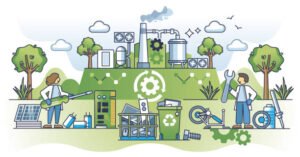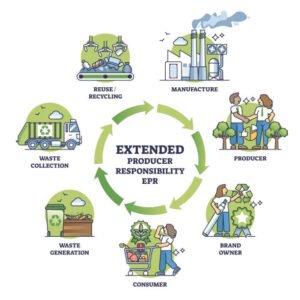
Introduction:-An industry-wide beacon of change in the search of sustainable practices is Extended Producer Responsibility, or EPR. Businesses need to understand the revolutionary potential of environmental PR as they navigate the landscape of environmental consciousness. Let’s see how EPR is changing industries across the globe, with powerful situations demonstrating its effectiveness.
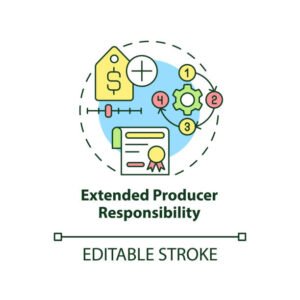
What is Extended Producer Responsibility (EPR)?
A policy known as “Extended Producer Responsibility” (EPR) holds producers accountable for the whole product lifecycle, including disposal of the product after the customer. Producers used to be solely in charge of the first phase of manufacturing. With EPR, on the other hand, they are responsible for managing their products through collection, recycling, and disposal at the end of their life cycle.
Read more:-
The Objectives of EPR:
- Encouraging Sustainability: EPR pushes manufacturers to use materials that are more easily recycled or biodegradable in the design of their products.
- Reducing solid waste: EPR seeks to lessen the quantity of solid waste that pollutes the environment or ends up in landfills by taking on the responsibility for product disposal.
- Encouraging Innovation: EPR provides producers with incentives to innovate and create more environmentally friendly goods and packaging.
- Shifting Costs: EPR places the financial burden of waste management back on producers, resulting in a more equitable system, rather than on taxpayers.




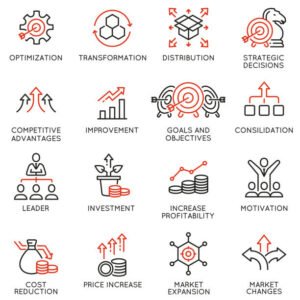
Examples of EPR Programs:
- Electronics: Manufacturers are required to gather and recycle outdated electronic gadgets under the EPR systems that several nations have put in place for electronic trash, or “e-waste.”EPR regulations require producers in the electronics industry to assume responsibility for their products’ whole lifecycle. Consider Apple Inc.’s recycling initiative. With programs like “Apple Trade-In,” the corporation encourages consumers to return outdated electronics while also making sure that materials are recycled and reused responsibly. This proactive strategy not only lowers electronic waste but also encourages a circular economy within the sector.
- Packaging: Manufacturers are encouraged to utilize recyclable or biodegradable materials and to assume responsibility for their correct disposal by means of EPR laws governing packaging materials.EPR initiatives are driving a paradigm shift in the packaging industry toward more environmentally friendly techniques. Take Loop Industries as an example. This company invented the idea of reusable packaging. Packaging is made for numerous uses, and Loop Industries is leading the way in the circular economy concept by working with major global brands like PepsiCo and Unilever. This creative strategy reduces waste and increases brand loyalty among people who care about the environment.
- Automotive Sector: To stop hazardous substances from leaking into the environment, battery manufacturers are frequently required to set up systems for the collection and recycling of spent batteries.In the automotive industry, EPR has also achieved great progress, especially with regard to battery disposal. This is best demonstrated by Tesla, an innovator in electric vehicles (EVs), and its battery recycling Giga Factories. Tesla enhances the sustainability of its electric vehicles (EVs) and lessens its environmental effect by recovering useful minerals from used batteries. This all-encompassing strategy emphasizes how crucial EPR is to fostering innovation and responsibility.
- Textile and Fashion Sector:Eileen Fisher is a fashion firm that is leading the way in sustainability. Among the many programs the firm has put in place is the “Renew” program, which allows customers to return worn Eileen Fisher apparel for store credit. In order to reduce waste and promote circular fashion practices, the returned products are either recycled into new clothing or resold as “renewed” items.
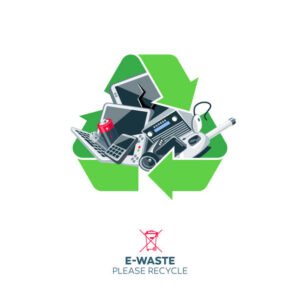
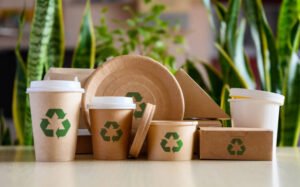



The Global Impact of EPR:
Globally, EPR is becoming more commonplace as governments and companies realize how important it is to advancing sustainability. EPR frameworks are well-established in nations like Canada, Japan, and Germany and have been shown to be successful in lowering waste and encouraging recycling.

Challenges and Future Outlook:
Even though Extended Producer Responsibility has many advantages, there are drawbacks as well, like implementation costs and problems with compliance for smaller companies. Furthermore, the success of EPR programs depends on the efficient enforcement and monitoring of these measures. With more nations and sectors adopting its ideals, the future of EPR is bright. In order to promote sustainable manufacturing and consumption behaviors, EPR will remain essential as customers grow more environmentally aware.
https://www.oecd.org/environment/extended-producer-responsibility.htm

In conclusion,
Extended Producer Responsibility (EPR) is a commitment to comprehensive sustainability that goes beyond simple regulatory compliance. Various industries, including electronics, automotive, packaging, and fashion, are adopting EPR as a driving force behind transformation. By means of proactive measures and cooperative endeavors, EPR not only mitigates environmental effects but also cultivates a responsible and innovative culture. EPR serves as a compass as we go forward on the path to sustainability, transforming sectors and creating a more sustainable future for future generations.
